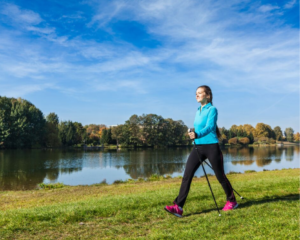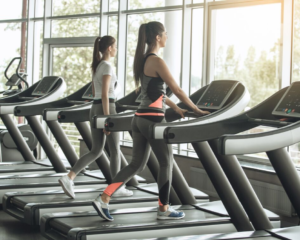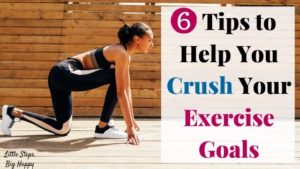If you are new to fitness and want to get started with walking, then you should definitely read on for my best walking tips for beginners. I will tell you everything you need to know to make your walks a great experience.
Walking is one of the best places to start when you are looking to begin getting physically active. It’s totally customizable, you can do it anywhere, and it has amazing health benefits.
To get started all you need is a decent pair of athletic shoes and 15 minutes to get you on the road to a healthy and fit life.
First, I’m going to talk about some of the benefits of walking, and then I will get into 7 great walking tips for beginners.
*Disclosure: This site uses affiliate links. This means that if you click on some of the links and make a purchase I receive a small commission. This in no way changes the price for you and helps to support this blog. I only recommend products that I believe would offer value to my readers. To learn more about my policy, click here.
Benefits of Walking
The American Heart Association recommends 150 minutes of moderate-intensity aerobic activity per week. A brisk walk (2.5 miles per hour) for 30 minutes, 5 days a week will have you easily meeting that recommendation. Here are some of the awesome benefits to your health you can get from walking:
-
Increased heart and lung fitness
-
Lower risk of heart disease and stroke
-
Stronger bones and better balance
-
Improved muscle strength and endurance
-
Decreased body fat
Now don’t worry if you are not at a point where you can walk for 30 minutes 5 days a week. Even getting up and walking 15 minutes at a time is going to have a positive effect on your health. Plus, you can always gradually work up to 150 minutes a week.
Walking Tips for Beginners
Here are 7 walking tips for beginners that will make sure you get the most out of your walks.
1. Wear good walking shoes
Wearing good walking shoes isn’t going to have a drastic effect on the health benefits of walking, but it is going to make the experience a lot more enjoyable. Good walking shoes are going to help support your feet properly as well as make sure you don’t develop things like blisters or sores once you start putting some mileage on your feet.
2. Maintain good posture
Maintaining good posture is one of the first elements to using good form when walking. Good posture helps make sure you hold your body in the proper position to ensure your legs move in a comfortable and natural walking stride.
Good posture also makes sure that your chest is open and your core is engaged. This helps your body stabilize and makes it easier to breathe.
When using good posture, make sure you:
-
Keep your back straight.
-
Engage your core. This means you pull your belly button toward your spine.
-
Keep your shoulders back and down away from your ears.
-
Keep your chin up and your eyes looking forward.

3. Use your arms
The next item in our walking tips for beginners is to make sure you pump your arms back and forth as you walk. When you pump your arms, you double the aerobic benefit from walking. This means you are going to get twice the workout in the same amount of time.
Plus, pumping your arms helps strengthen and tone the muscles in your arms and upper back. This makes walking a full-body workout.
As you walk, make sure you bend your elbows at 90 degrees and try to keep your hands relaxed. You want to swing each arm forward as the opposite leg takes a step. (Right arm forward as your left leg takes a step.)
Keep your elbows tucked into your sides and make sure your arms don’t cross the middle of your body as they swing forward.
When you are ready to increase your speed, increase the pace you pump your arms to help you go faster.
4. Use a heel-to-toe stride
With each step, aim to land heel first. Then you roll your weight evenly from the heel to the ball of the foot. Next, you will push off from the toes of your back foot.
Your back foot is going to give you the power that helps propel you forward.
When speed or power walking, shorten your stride and increase your pace. Don’t try to lengthen your stride to go faster. It can lead to discomfort or injury.
5. Pay attention to your halfway point
Make sure you plan out either your time or distance before you start your walk. Then as you are going along, make sure to pay attention to your halfway point.
You want to know when it’s time to turn around and head back home. You don’t want to accidentally overdo it on your walk and then have to struggle to make it back home. Or you could end up overexerting yourself and being unable to exercise for a few days as you recover.
If you find that your initial walk wasn’t long enough, you can always increase it closer to your starting point when you are confident you will be able to finish the walk safely.

6. Be realistic about your current endurance level
I can’t stress this one enough. Be realistic about your current ability level. If you know that a 20-minute walk is as long as you can comfortably go right now, then that is where you need to start. It’s ok!
The goal isn’t to be able to start walking and magically be walking 5 miles at top speed. The goal is to maintain a moderate level of activity for YOUR body. No one else’s.
The more you walk, the easier it will get and the faster and farther you will be able to go.
As you are walking make sure you aim for a moderate pace that is not overly difficult for you to maintain. Your breathing should be steady, but you shouldn’t feel out of breath.
If you do feel out of breath, it’s an indication you need to slow down a little bit and focus more on your breathing. While walking you should be able to talk, but not sing.
7. Increase your distance gradually
The last item in our walking tips for beginners is to make sure you increase your distance gradually. A safe recommendation is to increase your distance by no more than 10% per week.
A gradual increase makes sure that you don’t overtrain your body. Overtraining can lead to injuries and unnecessary soreness.
Your body will need time to adjust to each new increase in distance or time.
Conclusion on Walking Tips for Beginners
We have covered some of the awesome benefits of walking and 7 walking tips for beginners. You now know the best walking technique and why walking is so helpful for losing weight and improving your overall fitness level. You are now fully armed with all the information you need to get started walking today!
I would love to know some of your best beginner walking tips! You can comment below or email me at Candice@littlestepsbighappy.com. Follow me on Pinterest for more advice on beginner fitness.
Want more fitness tips for moms?
- 5 Powerful Reasons Exercise is Important for Moms
- How to Avoid Mom Guilt Over Exercising: 10 Quick Tips
- How to Find Time to Workout as a Busy Mom: 11 Tried & True Tips
- 7 Quick Workout Ideas for Busy Moms on the Go
- 7 Ways to Get a Quick Workout at Home
- 3 Reasons You Don’t Exercise Regularly and How to Start
- 6 Easy Tips to Help You Crush Your Exercise Goals
- 7 Easy Ways Moms Can Live a Fitness Lifestyle
- How to Run Better and Lose Weight: 10 Running Tips for Beginners
- 10 Tips for Hiring a Personal Trainer You’ll Love
- Quick & Helpful Tips for Setting up a Home Gym
- 5 Benefits of Running Clubs for Your Health & Wellness Goals in 2023
Pin this for later!

You might also like:




I’m a busy mom of 3 turned Health and Fitness Coach and Self Defense Instructor. I help inspire other moms to reach their health, fitness, and weight loss goals. You can usually find me chasing my kiddos around, training Brazilian Jiu-Jitsu, or sneaking away to read romance novels. About Me



